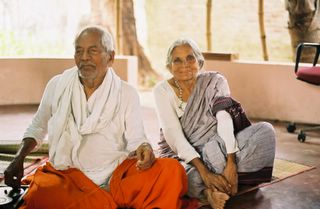Medha
In ancient Egyptian cosmology, the crescent moon was a boat for the gods to sail on the sky-river. Here in India, I can understand this. Instead of left-to-right as in more northerly areas, the new moon’s horns point up, looking indeed like a luminous canoe.
Yesterday, Medha Patkar and her team showed up on our doorstep two days after she was scheduled to arrive. It was like a tornado whirling through and carrying us with it. Best known for her work attempting to prevent a huge dam being built on the Narmada River, at the confluence of three states – Gujarat, Maharastra, and Madhya Pradesh. After a 20-year struggle, it was finally ruled that the dam would be built, but only to a height of 110 metres, and not to be raised, until all three million displaced people, many of them tribal, were given new lands and "rehabilitated" (whatever that actually means.) In the past week, Medha and her entourage, representing the National Alliance of People’s Movements, has been traveling up and down the coast of Tamil Nadu, speaking to unorganized workers and dalits, whose problems have often been overlooked by the government and the NGOs.
After almost an hour’s meeting of Medha and her staff trying to decide what villages to visit, I went and found Krishnammal, who came in and said, "We will visit these places. Get in the bus." Before we could all fit in the bus, we had to remove four huge branches, each with about 40 bananas. We drove at a fairly reasonable speed along the road, but for some reason we had to stop at every village we passed that had any relationship with a people’s movement. We stopped at Kilvenmani, where, in 1968, 44 women and children were killed by landlords, starting Krishnammal’s long work in this area; at Valivalam, to see the girl’s hostel, and several other roadside places. Throughout the day, people were almost left behind as the bus started.
We again visited the flooded villages, including Vallankallimedu, the village that ran from the tsunami, which saddened me even more that it had before. The tsunami water had, in fact, reached the village (I had not understood this previously) but they were still refused aid, like most groups other than the fisherfolk themselves, and they had very little to eat
We then visited a village where the people – all dalits -- were all involved in making and selling baskets for the fishermen. The village was five or six kilometers from the sea, but bodies had floated up the tidal river into their area. The people had no way of making a living anymore. Their baskets were very strong and well-made, they fold into small packages, and a large one took only two hours to make, which I found incredible ( the techniques I know, a similarly sized basket would take at least ten hours.) I bought several baskets. Krishnammal now has a plan to buy baskets from the makers, put petticoats and sambar powder in them, and give them to women. I went into the shed to watch the women make the baskets, and was nearly left behind when the bus started again. I plan to use the baskets to collect money for Krishnammal’s houses.
By this point, Medha was a bit agitated about time. She wanted to get to the Collectorate by 4 p.m. for a press conference. She was a whirlwind of ideas and commentary and plans for new village industries, all of which she wanted put into practice immediately. She, unlike Krishnammal, is not rooted in the community, and does not hold with Krishnammal’s practice of waiting until people are "out of graveyard mode." I had gotten used to Krishnammal’s lax attitude about time, and Medha’s need for punctuality was beginning to aggravate me, an irritation compounded by a headache, the hot sun, and skipping lunch.
Medha’s great strength, however, is as a speaker. At the press conference, her speech on the necessity of livelihood rehabilitation and involving the local people was very powerful. This is not one of Krishnammal’s better skills. When asked to give a few remarks, her speech, as always, was rambling, and Medha soon took the microphone back. To understand Amma, you have to listen to her for at least a few hours.
We then took a bus to a distribution area for construction workers in Nagapattinam, all of whom are out of work since no one will rebuild anything until the 26th, for fear of another tsunami. By this time I am extremely tired and my head feels like it is being squeezed together, so after a few photos, Krishnammal, David and I take a jeep home, where I go to bed without even having dinner. Medha and her people did not get back until midnight, but backed off of their original plan of leaving at 3 a.m. for their next encounter.
In the Light,
Aliyah


0 Comments:
Post a Comment
<< Home